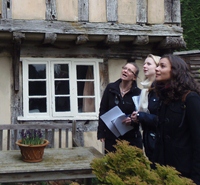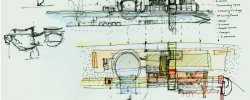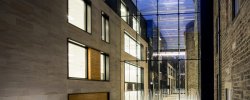Building History UK
 The course, devised in collaboration with English Heritage (now Historic England), is unique in combining British architectural history with practical tuition in interpreting building fabric.
The course, devised in collaboration with English Heritage (now Historic England), is unique in combining British architectural history with practical tuition in interpreting building fabric.
It provides an overview of architectural evolution and an awareness of the principal approaches to the exploration of architectural evidence. It also sets out to train students in the rigorous and effective use of primary sources, preparing them for careers in historic building research, recording, assessment and curation, or in suitable cases, for progression to doctoral-level research.
Teaching and learning
The course is heavily taught in the first year by invited speakers from a mixture of academic and professional backgrounds. Lectures are matched to field trips. The emphasis is on learning to evaluate architectural and documentary evidence and to formulate informed and accurate assessments.
The second year is divided between a professional placement and a personal research project which constitutes the dissertation.
By the end of the programme, students will have acquired the type of research training required to carry on to the PhD, or if conceived as a standalone degree, will have acquired the skills to specialise and enhance their professional prospects.
To continue to read for the PhD degree following the course, students must achieve an overall total score of at least 70%. Continuation is also subject to Faculty approval of the proposed research proposal, and the availability of an appropriate supervisor.
Contact time
- Lectures: c.100 hours (first year)
- Seminars and classes: c.60 hours (guided site visits; first year)
- Practicals: c.40 hours (first year)
- Supervision: 3 hours per year
Thesis
- Dissertation: 20, 000-25, 000 words (including footnotes but excluding bibliography and appendices).
Essays, projects and written papers
- Two essays: 3, 500 words maximum each.
- One recording project: 3, 000-5, 000 words, plus drawings and photographs.
- One research proposal: 2, 000-3, 000 words.
Practical
- Log-book/portfolio and report (3, 000 words maximum) from professional placement.
Other
- Field test of one hour's duration.
- A non-assessed (formative) essay is required during the first term of Year 1.
Some assignments and the dissertation require literature reviews. Students are expected to undertake 'Crit' sessions on the recording project and dissertation proposals. Feedback is given in supervisions, supervisors' reports and throughout the course on request.
Expected academic standard
Applicants for this course will normally have achieved a UK 2.i honours degree or overseas equivalent.
There is provision to accept non-standard applicants who do not satisfy the standard academic criterion but such applicants must produce evidence of relevant and equivalent experience and their suitability for the course.
Language requirement
- IELTS Academic: Overall score of 7.5 (a minimum of 7.0 in each individual component)
- TOEFL Internet: Overall score of 110 (a minimum of 25 in each individual component)
- CAE: Grade A or B (with at least 193 in each individual element) plus a Language Centre assessment
- CPE: Grade A, B, or C (with at least 200 in each individual element)







